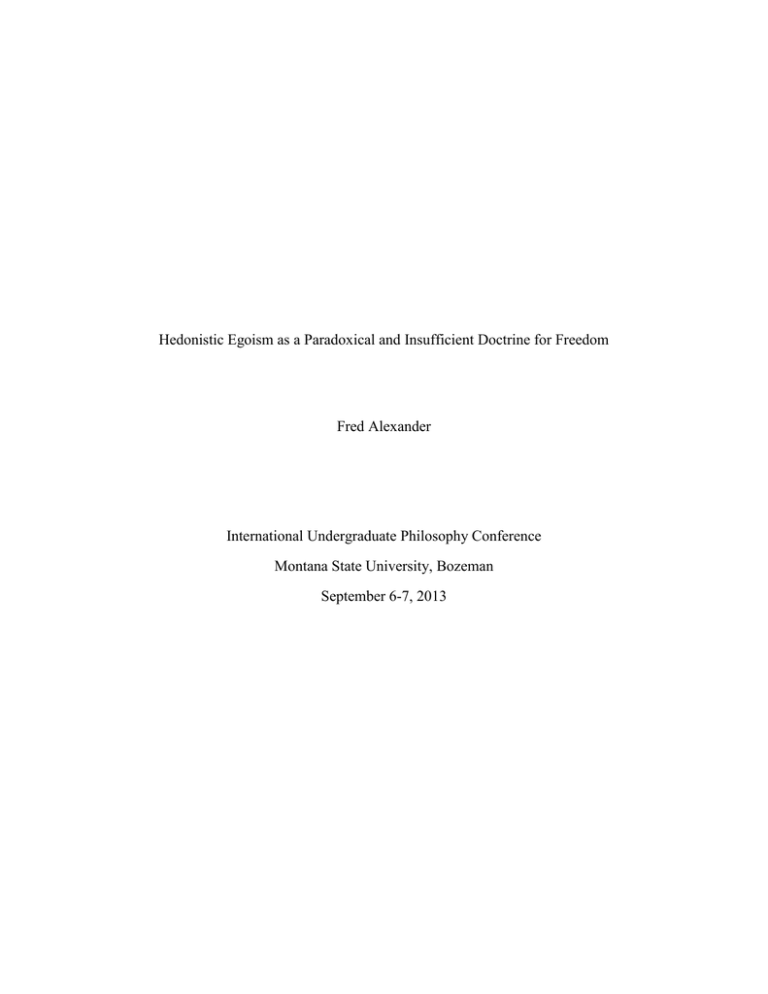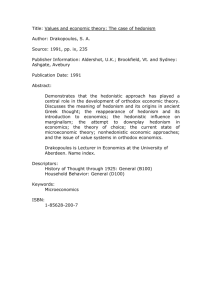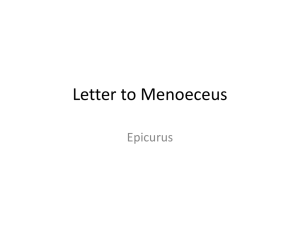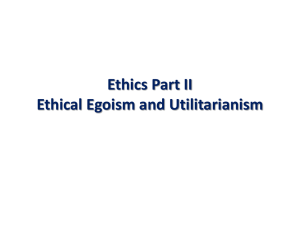Hedonistic Egoism as a Paradoxical and Insufficient Doctrine for Freedom
advertisement

Hedonistic Egoism as a Paradoxical and Insufficient Doctrine for Freedom Fred Alexander International Undergraduate Philosophy Conference Montana State University, Bozeman September 6-7, 2013 2 Abstract Resulting from the prevalence of hedonistic egoism within the youth culture and the media targeted to this demographic, this essay offers a brief discussion of hedonistic egoism absent in much of contemporary ethics. Analyzing Fred Feldman’s pure hedonism as discussed in Pleasure and the Good Life: Concerning the Nature, Varieties, and Plausibility of Hedonism, hedonistic egoism is defined as an extension of Feldmanian pure hedonism. Discussing the use of hedonistic egoism in modern society by certain societal groups, especially adolescents and young adults, as a means to seek freedom from certain societal authorities such as the law, or at least portions of it, the differences between negative and positive freedom are explored using Erich Fromm’s Escape From Freedom. It is then argued that when hedonistic egoism is used by individuals to seek freedom, whether it be negative or positive, certain paradoxes arise. Firstly, negative freedom, if existent, will exist merely psychology while, secondly, so far that pleasure and pain act as new authorities and egoism is present, positive freedom becomes an impossibility. 3 Introduction In modern American society, hedonistic egoism as a philosophic and ethical doctrine has been romanticized in reality television shows such as the Jersey Shore and films such as Project X targeted to adolescents and young adults. Further, whether as a result of the media’s portrayal of hedonistic egoistic behaviors or some other reason, these groups, and perhaps others, have begun embracing this authoritative moral value system using it as a means to seek freedom from external societal authoritative systems such as the law, if only implicitly and unconsciously. However, using hedonistic egoism to seek freedom is an insufficient means to acquire freedom ultimately resulting from inherent paradoxes present in this approach. In essence, when hedonistic egoism is used by an individual to seek freedom, negative freedom may develop psychologically but real world negative freedom from external authorities and positive freedom will remain inexistent resulting from its authoritative moral values and explicit egoistic doctrine. Defining Hedonism as an Authoritarian Moral Value System In Pleasure and the Good Life: Concerning the Nature, Varieties, and Plausibility of Hedonism Fred Feldman writes, “‘Every person by nature ultimately seeks only pleasure and ultimately shuns only pain; therefore, pleasure is the only intrinsic good and pain is the only intrinsic evil.’”1 In addition, Jeremy Bentham writes in On the Introduction to the Principle of Morals and Legislations: Nature has placed mankind under the governance of two sovereign masters, pain and pleasure. It is for them alone to point out what to do, as well to point out what we ought to do, as well to determine what we shall do. On the one hand the standard of right and wrong, on the other chain of causes and effects, are fastened 1 Fred Feldman, Pleasure and the Good Life: Concerning the Nature, Varieties, and Plausibility of Hedonism (Oxford: Clerendon Press, 2004), 5 4 to their throne. They govern us in all we do, in all we say, in all we think: every effort we can make to throw off our subjugation, will serve but to demonstrate and confirm it.2 Now while Bentham claims that pleasure and pain “govern” everything that an individual does, says, and thinks, Feldman writes, “Hedonism…says nothing about what we should do, or what we should seek. It says something about what's intrinsically good.”3 In this way, Feldman’s hedonism is hedonism in its purest form whereas Bentham’s hedonism, though also utilitarian4, is a form of motivational hedonism. Pure Hedonism By pure hedonism Feldman means that form of hedonism which merely asserts pleasure to be intrinsically good and pain intrinsically evil. Of importance here is this notion of the intrinsic goodness of pleasure and the intrinsic evil of pain. For Feldman, “…a thing has intrinsic value when it has value in itself.”5 In this way, pleasure being intrinsically good has goodness in itself and pain being intrinsically evil has evil in itself. Further, “the intrinsic value of an episode of pleasure [or pain] must depend upon facts about that episode of pleasure [or pain] itself…and not upon extrinsic features.”6 External things may be pleasant or painful, but that does not make them intrinsically good; rather “…it is the pleasure [or pain] we get from pleasant [or painful] things that is intrinsically good [or evil].”7 2 Jeremy Bentham, An Introduction to the Principles of Morals and Legislation (Oxford: Clarendon Press, 1823), I.1 accessed May 15, 2013, http://www.econlib.org/library/Bentham/bnthPML1.html 3 Feldman, Pleasure and the Good Life, 31 4 In this paper, I will not be discussing Bentham’s utilitarianism in any great detail. For a better discussion, Jeremy Bentham’s text cited above is useful as well as contemporary hedonist Michel Onfray’s works on the topic of hedonism. 5 Feldman, Pleasure and the Good Life,, 26 6 Ibid 7 Ibid, 2, 23 5 When discussing the experience of pleasure and pain, Feldman differentiates between sensory pleasures and pains and attitudinal pleasure and pains writing, “Sensory pleasure [or pain] is a feeling or sensation. You have it when you are experiencing ‘pleasurable [or painful] sensations.’ Attitudinal pleasure [or pain] is (as the name suggests) a propositional attitude. You have it when you are…taking pleasure [or pain] in…something.”8 In this way, while sensory and attitudinal pleasures or pains may be intertwined, this is not necessary. On the contrary, though sensory pleasures or pains may result from an attitude about some sensation, attitudes may develop when there is no corresponding sensation. For example, an individual may take sensory pleasure when taking a sip of champagne while also experiencing an attitude of pleasure resulting from this act. On the other hand, for a peace activist, the existence of peace might cause attitudinal pleasure without any corresponding sensory pleasure.9 Understanding this, I will now turn to a discussion of hedonistic egoism. Hedonistic Egoism Hedonistic egoism is a form of motivational hedonism, discussed briefly above. For Bentham, pleasure and pain motivate behavior naturally and unconsciously. In hedonistic egoism, however, the motivation becomes conscious whereby the hedonistic egoist consciously seeks pleasure while consciously avoiding pain. Whether or not all individuals are bound unconsciously to pleasure and pain, as Bentham suggests, becomes of little significance to the hedonistic egoist who would consciously seek pleasure even if there were no unconscious motivation.10 This motivation discussed above, however, merely reflects the hedonistic aspect of hedonistic egoism, but there is also an egotistical motivation that narrows the motivation of 8 Feldman, Pleasure and the Good Life, 2 Ibid, 56 10 “Hedonism,” Dan Weijers, last modified August 10, 2011, http://www.iep.utm.edu/hedonism/#SH1c. 9 6 hedonistic egoism as a whole. Here, pleasure is pursued and pain avoided for the self solely narrowing the abstract motivation that exists in mere motivational hedonism. The hedonistic egoist as an egoist thus is not concerned with the pleasure and pain of others. In fact, if his or her pleasure would cause another pain, so far that that pain does not reduce his or her pleasure, the hedonistic egoist would engage in that act of pleasure. The Internet Encyclopedia of Philosophy states that robbing an orphanage is permissible for the hedonistic egoist if it would promote greater pleasure than pain for the individual hedonistic egoist in question.11 In this way, hedonistic egoism acts as a system of moral relativism. The hedonistic egoist holds him- or herself to no objective set of moral stands; rather, he or she chooses for him- or herself the morally acceptable means to pursue pleasure. 12 As mentioned above, that might mean causing another pain. How much pain may be brought against another individual and what individuals the hedonistic egoist in question may harm are purely subjective concerns, however, and there is no objective means to determine what they might be. Further, whether precedence will be given to sensory or attitudinal pleasures is, as well, subjective for each individual experiences pleasure in different ways than another. More so, what may cause pleasure to one may cause pain to another. For this, the morality of hedonistic egoism becomes more pronounced and identifiable. Concluding this section, I would like to state that because pleasure and pain act as authorities governing what an individual will choose to do, hedonistic egoism becomes more than a simple system of morality; it becomes an authoritative moral value system. This authoritative nature of hedonistic egoism will become of great importance in the final section of 11 Ibid 12 Gowans, Chris. "Moral Relativism." Stanford Encyclopedia of Philosophy. December 9, 2008. http://plato.stanford.edu/entries/moral-relativism/ (accessed 29 May, 2013). 7 this paper. However, now, I will turn to a brief discussion of freedom, which will also be of importance in constructing the final defense of this paper’s thesis. Differentiating Between Positive and Negative Freedom In Escape from Freedom, Erich Fromm defines freedom simply as “the complete emergence of an individual” occurring through “individuation.”13 This process of individuation severs familial and sociological primary ties which “connect the child with its mother, the member of a primitive community with his clan and nature, [] the medieval man with the Church and his social caste,”14 or the member of modern capitalist society to capital.15 Turning to Fromm's interpretation of the Biblical story of Adam and Eve, one can see what Fromm means by primary ties and how difficult true emergence from them can be. In the Garden of Eden, Fromm asserts that a primary tie existed between Adam and Eve and God and when the former two ate from the tree of the knowledge of good and evil, this tie was severed. For Fromm, “Acting against God's orders means freeing himself from coercion, emerging the unconscious existence of prehumen life to the level of man. Acting against the command of authority, committing a sin, is in its positive human aspect the first act of freedom…”16 However, this negative freedom, or “freedom from,” leaves Adam and Eve feeling alone and isolated. “The original harmony between man and nature is broken […] To transcend nature, to be alienated from nature and from another human being, finds man naked, ashamed. He is alone and free, yet powerless and afraid.”17 While freed from God’s authoritarian moral values (i.e. to never disobey Him), Adam and Eve outside Eden remain “tied to the world from which [they] emerged; [they remain] part 13 Erich Fromm, Escape from Freedom (New York: Holt, Reinhart & Weinstein, Inc, 1969), 40 Ibid 15 Ibid, 128 16 Ibid, 50 17 Fromm, Escape From Freedom, 50 14 8 of nature …”18 Positive freedom, or “freedom to,” is not experienced.19 For Fromm, in order to find positive freedom the individual must engage in “active solidarity with all men and his spontaneous activity, love and work, which unite him again with the world, not by primary ties but as a free and independent individual.”20 Negative freedom is necessary, but not sufficient for positive freedom.21 Simply freeing one’s self from outside authorities is insufficient to assure that an individual becomes a free and independent individual. Rather, the now freed individual, as with Adam and Eve, may form new primary ties elsewhere. Fromm extrapolates on the reasoning more in his text, but to discuss this reasoning further is beyond the scope of this paper. For that reason, what has been said here of negative and positive freedom is sufficient for what will be discussed in the remainder of this essay. Hedonistic Egoism as a Paradoxical and Insufficient Doctrine for Freedom In the introduction I stated that when hedonistic egoism is used by an individual to seek freedom, negative freedom may develop psychologically but real world negative freedom from external authorities and positive freedom will remain inexistent resulting from its authoritative moral values and explicit egoistic doctrine. To understand this, I must first explain how hedonistic egoism is in modern society being used by certain societal groups such as adolescents and young adults to seek freedom. This conversation which will then lend itself to the obvious conclusion that when freedom does develop, it is only of a negative type, and even there is only psychological negative freedom without any corresponding real-world freedom from the societal authorities from whence these individuals attempt to free themselves, namely the law. 18 Ibid Ibid 20 Ibid 21 Ibid 19 9 Hedonistic Egoism and the Search for Freedom: Establishing Negative Freedom Merely Psychologically As Fromm has pointed out, negative freedom exists when an individual possesses freedom from primary ties, or the external familial or sociological authorities that govern that individual’s behavior. In today’s society, many attempt to free themselves from prevalent primary ties including those of the law, or more often a specific law or set of laws. For adolescents and young adults, as well as others, hedonism and often times hedonistic egoism provide this escape psychologically. The reason is that many explicitly pleasurable behaviors have been illegalized and to engage in these behaviors thus means breaking the law and in turn freeing one’s self from it psychologically. Such laws that I will offer as examples are those which forbid anyone under 21 to drink alcohol, under 18 to use tobacco products, and those that illegalize the use of cannabis and other drugs. Now, some hedonists, such as the utilitarians, may follow these laws and seek pleasure in legally sanctioned manners seeking pleasure not merely themselves but also for others. For that reason, they may view law-breaking actives, even when promoting pleasure, as immoral and thus refuse to engage in them. Hedonistic egoists, however, concerned only with their own subjective pleasure, do not, by definition, care about the concerns of others. Even when other means of pleasure are available, breaking the law is of little concern to them so long that in breaking that law pleasure becomes possible. Further, as is evidenced with the existence of high school and college parties where alcohol, tobacco, cannabis, and other drugs are present and the teenage arrests for underage drinking and possession of cannabis and other drugs, this hedonistic egoistic behavior can be seen as readily occurring in modern American society. The reason I consider these 10 behaviors hedonistic egoistic behaviors is because that in breaking a law merely to seek pleasure for the self, all the central components of hedonistic egoism have, at least implicitly, been embraced. Further, in breaking a law, the individual law breaker, by his or her actions, states that he or she is seeking freedom from it even if that desire for freedom is not explicitly stated. Just as Bentham argued that pleasure and pain unconsciously motivate behavior, so too the desire for freedom can become an unconscious motivator of an individual’s behavior. After all, for an individual who breaks a law willingly, consciously, and continuously, the behavior of the law breaker implies a desire for freedom from that law. As the old proverb says, “Actions speak louder than words.” In this case, for the hedonistic egoist who breaks the law, this is certainly true. But this freedom is merely negative in that it frees the individual from the law, but it does not free the individual to be anything beyond what he or she already is. I will discuss this in a moment. Here, I would like to add that this negative freedom is only psychological. These hedonistic egoists are not in reality freed from the law or laws that they break; this law or these laws still stand and the law-breaking hedonistic egoist can still be punished for breaking it or them respectively. This then is the first paradox of hedonistic egoism when it is used as a means to seek freedom. And arguably, this would be true with any form of hedonism and any other philosophic or religious doctrine that would guide an individual to seek freedom from a law by breaking it. Hedonistic Egoistic Psychological Negative Freedom Does Not Produce Positive Freedom The second paradox of using hedonistic egoism as a means to seek freedom is that pleasure and pain become new authorities over the individual. Just as Adam and Eve freed themselves from God and were subjugated to the authority of nature, so too the hedonistic egoist 11 freed psychologically from legal authorities is subjugated to the authority of pleasure and pain. As Bentham wrote, “every effort we can make to throw off our subjugation [to pleasure and pain], will serve but demonstrate and confirm it.”22 Whether or not this is true for all individuals, as Bentham believed, it is at least true for the hedonist. This means simply that positive freedom is not produced as a result of hedonistic behavior in whatever form that hedonism exists including hedonistic egoism. Further, as Fromm has noted, positive freedom can only be found when an individual engages in “active solidarity with all men and his spontaneous activity, love and work, which unite him again with the world, not by primary ties but as a free and independent individual.”23 This active solidarity with others is impossible for the hedonistic egoist because egoism separates the individual egoist from others. By placing one’s own pleasure-seeking desires above everyone else’s solidarity with others becomes impossible. The hedonistic egoist, by virtue of being an egoist, will always pursue his or her notion of moral right, or that which causes selfish pleasure, even when that might cause pain to another, above the desires, concerns, and pleasures of another person. For the egoist, all other people are merely pawns to be manipulated and used for his or her own purposes, which for the hedonistic egoist is the pursuit of pleasure. Resulting from both of these reasons, positive freedom cannot not be acquired by the freedom-seeking hedonistic egoist. Conclusion At this juncture, I hope I have supplied sufficient evidence for my argument that when hedonistic egoism is used by an individual to seek freedom, negative freedom may develop psychologically but real world negative freedom from external authorities and positive freedom 22 23 Bentham, An Introduction to the Principles of Morals and Legislation, I.1 Fromm, Escape From Freedom, 52 12 will remain inexistent resulting from its authoritative moral values and explicit egoistic doctrine. I explained how the hedonistic egoist attempts to find freedom merely through his or her actions and how these actions produce no real world freedom but only psychological negative freedom. I also looked at positive freedom and showed that pleasure and pain become new authorities over the individual maintaining the subjugation of the hedonistic egoist only under a new master. Further, I discussed how solidarity becomes an impossibility for the egoist and that as a result positive freedom is further stifled. The main societal group I examined were adolescents and young adults but what has been discussed can be extrapolated and applied to any hedonistic egoist of any sociological group who breaks the law in search of selfish pleasure and thus freedom from any societal authority including but not limited to the law. 13 Works Cited Bentham, Jeremy. An Introduction to the Principles of Morals and Legislations. Oxford: Clarendon Press, 1823. Feldman, Fred. Pleasure and the Good Life: Concerning the Nature, Varieties, and Plausibility of Hedonism. Oxford: Clarendon Press, 2004. Fromm, Erich. Escape From Freedom. New York City: Holt, Reinhart & Winston, Inc. , 1969. Gowans, Chris. "Moral Relativism." Stanford Encyclopedia of Philosophy. December 9, 2008. http://plato.stanford.edu/entries/moral-relativism/ (accessed 29 May, 2013). Weijers, Dan. "Hedonism." Internet Encyclopedia of Philosophy. August 10, 2011. http://www.iep.utm.edu/hedonism/#SH1c (accessed May 15, 2013).







